Pope Francis in Africa: 5 Powerful Quotes
BY CHRIS KERR | November 30, 2015
Pope Francis’s visit to Kenya, Uganda, and Central African Republic was historic in many ways. It began just days before the C21 U.N. Climate Summit commenced in Paris, a meeting that could have significant ramifications for the people of Africa. Pope Francis also had a Papal first, visiting an active war-zone when he entered the Central African Republic. And, as we have come to expect, the reality of the economically poor and marginalized were central to his journey. This was evident throughout, including his visit to a Nairobi slum and his choice to unofficially begin the “Year of Mercy” by opening the first church door in the Central African Republic.
While there are many stories to be told and messages to be highlighted I wanted to identify five quotes from his time in Africa that illustrate some of the themes of the trip.
Pope Francis: His Approach
While at the end of his trip, his message to the diplomatic core and other dignitaries at the Presidential Palace in Bangui, Central African Republic, illuminated the spirit of Francis throughout his time in Africa. He is a person of hope, a hope rooted in his love for Christ. This hope spills out in everything that he does and invites Catholics and all people to consider a world that is different: more peaceful, less indifferent, more just — a world where human dignity reigns.
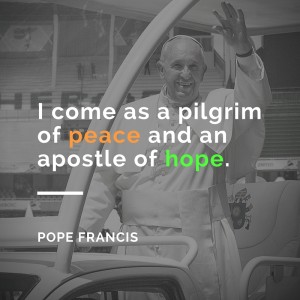
Share via Facebook.
An Invitation to Solidarity That Overcomes Corruption
During his opening remarks to Kenyan President Uhuru Kenyatta and other dignitaries on November 25, he emphasized “a spirit of solidarity” as a framework from which to work for the common good. Francis noted the importance of integrity and transparency, a nod to the systemic challenges of political corruption plaguing Kenya at various levels of government.
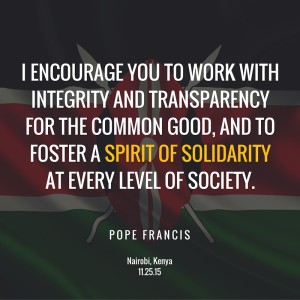
Share via Facebook.
The Path of Jesus Goes From the Poor
If I could choose one speech to sum up what Pope Francis means to the Church, this address would probably be it. Pope Francis began his address to residents of the Kangemi slum in Nairobi, Kenya, on November 27 by saying that he felt “very much at home” sharing time with brothers and sisters who have a “special place” in his life. He elaborated saying, “I am here because I want you to know that your joys and hopes, your troubles and your sorrows, are not indifferent to me.” Finally, he posed a question to explain his advocacy for the poor and marginalized, asking, “How can I not denounce the injustices which you suffer?”
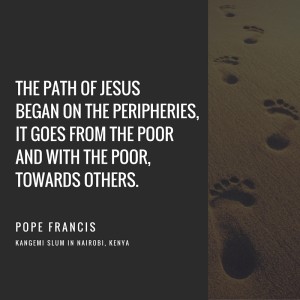
Share via Facebook.
God is Peace
Pope Francis visited the Grand Mosque of Koudoukou in Bangui, Central African Republic, to meet with the Muslim community. In his brief public statement he stated very clearly, “God is peace” and then re-stated the phrase using “salam,” the Arabic word for peace. This follows many interfaith efforts to promote peace, dialogue, and a common sense of humanity by Pope Francis. Most notable for people in the U.S. is likely his visit to the 9/11 memorial where faith leaders from a variety of religious traditions, both Christian and non-Christian took part in a collective prayer for peace. As the world struggles to differentiate between the acts of those who misuse God to justify violent acts, Pope Francis’s presence with people of other faiths, particularly Muslims, sends a strong message. God is peace. God salam.
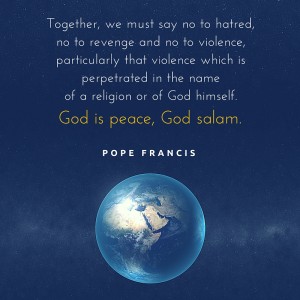
Share via Facebook.
The Faces of Climate Change
With the Paris COP21 U.N. Climate Summit impending, Pope Francis chose to address climate change during a visit to the U.N. regional office in Nairobi, Kenya. He stated his desired result for the Summit very clearly saying, “I express my hope that COP21 will achieve a global and ‘transformational’ agreement based on the principles of solidarity, justice, equality and participation.” Citing Laudato Si’, his encyclical on climate change, and his address during the Second World Meeting of Popular Movements in Bolivia earlier this year, he spoke specifically to issues facing African nations that will harm people and the Earth they inhabit.
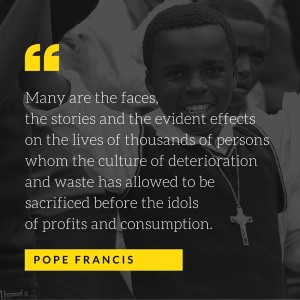
Share via Facebook.
Chris joined the Ignatian Solidarity Network (ISN) as executive director in 2011. He has over fifteen years of experience in social justice advocacy and leadership in Catholic education and ministry. Prior to ISN he served in multiple roles at John Carroll University, including coordinating international immersion experience and social justice education programming as an inaugural co-director of John Carroll’s Arrupe Scholars Program for Social Action. Prior to his time at John Carroll he served as a teacher and administrator at the elementary and secondary levels in Catholic Diocese of Cleveland. Chris speaks regularly at campuses and parishes about social justice education and advocacy, Jesuit mission, and a broad range of social justice issues. He currently serves on the board of directors for Christians for Peace in El Salvador (CRISPAZ). Chris earned a B.A. and M.A. from John Carroll University in University Heights, Ohio. He and his family reside in Shaker Heights, Ohio.

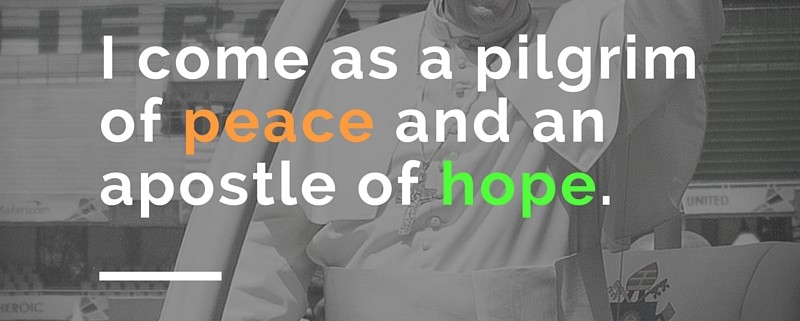
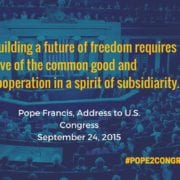

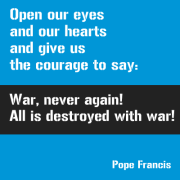
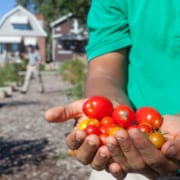
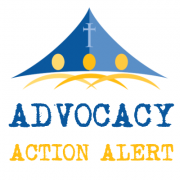
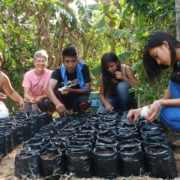



Leave a Reply
Want to join the discussion?Feel free to contribute!